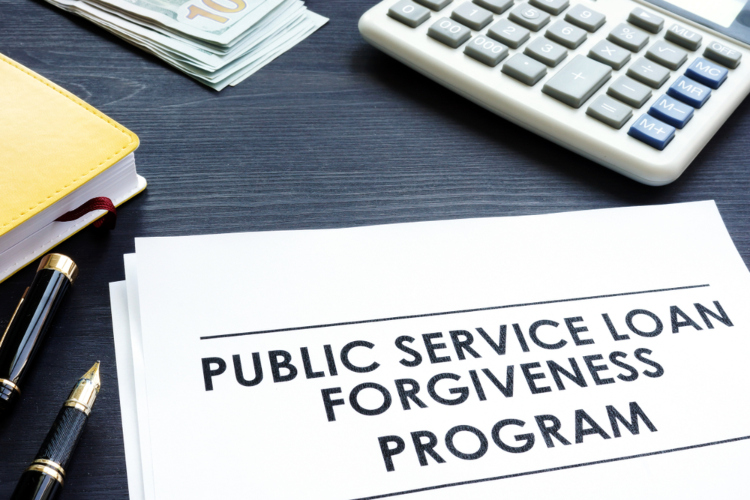Few qualify for public service loan forgiveness, often due to bad information, lawsuit says

Shutterstock
As of March 2019, the U.S. Department of Education has forgiven the loans of less than 1% of borrowers who applied for the Public Service Loan Forgiveness Program, according to a recent lawsuit filed by the American Federation of Teachers, AFL-CIO. The lawsuit, which was filed in the U.S. District Court for the District of Columbia, alleges that the agency has failed at correctly processing the PSLF applications.
The action, filed July 11, accuses the Department of Education of due process violations, inadequate notice of denials and arbitrary and capricious actions. The complaint seeks a court order vacating PSLF and Temporary Expanded Public Service Loan Forgiveness denials for each individual plaintiff, and it seeks an injunction against the department preventing it from denying any more applications until the court approves procedures to fix the alleged problems. Also, the lawsuit seeks new procedures whereby PSLF applicants can contest denials and introduce evidence to rebut Department of Education determinations.
Besides the AFT, named plaintiffs include several individual teachers, a U.S. Department of the Treasury employee and a public school psychologist. The PSLF program was finalized in 2007, and it was expected that loans would start being forgiven in October 2017. In 2010, the federal government eliminated the Federal Family Education Loan program, which was a system of private loans, and since then, most borrowers take out federal student loans, with call center and billings work outsourced to loan servicers.
While no loan servicer is named as a defendant, a good deal of the lawsuit alleges that they are responsible for data inconsistencies in loan reports sent to FedLoan Servicing, which oversees the PSLF program. FedLoan Servicing gets the loans for borrowers seeking public service loan forgiveness, according to the complaint, and there’s often inconsistencies in payment history data as well as misinformation about who qualifies for the program. The complaint also alleges that the Department of Education knows there are “widespread misrepresentations” loan servicers make about the PSLF program, but the department rarely holds the servicers accountable.
Some lawyers whose work involves helping borrowers with student loan issues say that the allegations in the lawsuit are not surprising. There’s a sense that loan servicing is a volume business, with call center employees pressured to get through phone communications as quickly as possible and no incentive to provide borrowers with better information.
“The complaint lists very specific instances where borrowers received misinformation. I hear similar complaints every single day,” says Heather Jarvis, a North Carolina lawyer who provides educational resources and training for student-loan borrowers.
“Loan servicers have incentives to be fast and efficient, because the more they can do with fewer employees, the more money they make,” she says. “They are not well-suited for dealing with a bureaucracy.”
In a statement about the lawsuit, Liz Hill, the Department of Education press secretary, said that the agency is “faithfully administering the complex program that Congress passed.”
Who qualifies for PSLF has been the subject of confusion and even litigation. People who qualify are government employees and those who work for nonprofit groups designated as tax-exempt under Section 501(c)(3) of the Internal Revenue Code. But people who work for nonprofit employer without (c)(3) status can also qualify for PSLF, if their employer’s primary purpose is to provide specific types of qualifying services.
The American Bar Association, which has 501(c)(6) status, sued the department in 2016 after the department dropped some public interest lawyers from the PSLF program on the basis that their employers did not provide a qualifying service. Most of the lawyer-plaintiffs received letters confirming eligibility for the program between 2012 and 2014, but by 2016 all were notified that the determinations were reversed because their employers did not provide a qualifying service.
In February, a U.S. District Judge for the District of Columbia found that when the department changed its interpretation of the PSLF regulation, it did not adhere to notice standards mandated under the Administrative Procedure Act, and those changes were arbitrary and capricious. An appeal is pending.
In addition to requirements about employers and the type of work done, another PSLF program prerequisite is that borrowers work in public service for at least 10 years, and make 120 qualifying loan payments after Oct. 1, 2007. The department has miscounted qualifying payments, and loan servicers give borrowers seeking public service loan forgiveness wrong information, according to the AFT complaint.
Lena Konanova, a partner with New York City’s Selendy & Gay who represents the plaintiffs, says that employees at loan servicer call centers work off a script, and there’s often a warning if a call is longer than seven minutes, like a red light flashing on the employee’s computer. A portion of the employees’ compensation is reserved for bonuses, she says, which are determined based on the employees consistency in keeping the calls short.
“There’s very little time to walk borrowers through different financial situations that require more complex answers,” Konanova says. “We believe that’s why call centers end up trying to get you off the phone as quickly as possible.” Her firm also has a lawsuit seeking class action status pending in the U.S. District Court for the Southern District of New York against the loan servicer Navient. No loan servicers were named as defendants in the American Federation of Teachers lawsuit because it seeks change in the Department of Education’s process for PSLF determinations, she says.
When the FFEL program was eliminated and the government contracted with outside loan servicers, it paid approximately $2.20 a month per borrower, says Christopher P. Chapman, the president and CEO of the nonprofit law student organization AccessLex. It provided borrowers with graduate school loans until the FFEL was eliminated.
“From my standpoint, the price they are paying those servicers is well below what it would cost to offer good services to borrowers,” Chapman says. His organization offers a webinar for law students about student loans, which he says takes at least 30 minutes.
“Student loan servicing, particularly for federal loans, is very different than any other consumer loan,” Chapman says. “There are things about it that make it much more challenging than mortgage, car loan or credit card servicing.”
He adds that most people, including lawyers, don’t know what kind of loans they have, and there are too many variables to qualify for public service loan forgiveness.
“Most of the rejections are done for technically correct reasons, and most of the time people are getting bad information from servicers,” Chapman says. “I think it’s an example of what happens when you don’t properly plan for execution of any program—a lot of people won’t have the right loans.”



